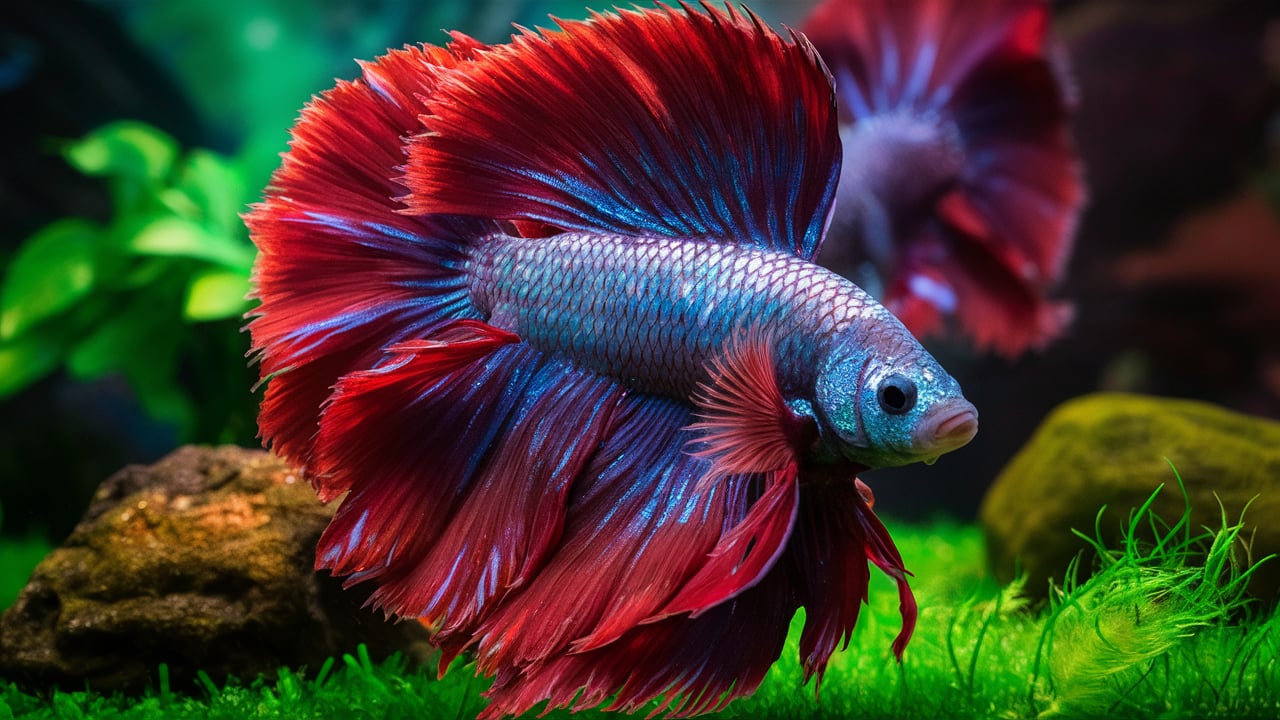Betta fish, with their vibrant colors and flowing fins, are a beloved addition to aquariums worldwide. Enter the world of Biggest Betta Fish, where size and magnificence reign supreme. This exploration, brought to you by Koi Fish Tips, will delve into the fascinating world of these aquatic giants, uncovering the secrets behind their impressive size and the best practices for keeping them healthy and happy.
Unveiling the Giants: Biggest Betta Fish
The term “Biggest Betta Fish” is often used to describe fish that are significantly larger than the average betta. These magnificent creatures are the result of selective breeding programs focused on maximizing size and finnage. While the average betta typically measures 2-3 inches, the biggest betta can reach lengths of 4-6 inches or even larger.
The Quest for Size
The pursuit of Biggest Betta Fish is driven by a combination of factors:
- Aesthetic Appeal: Larger betta have a more impressive presence in the aquarium, with their flowing fins and bold colors creating a captivating visual spectacle.
- Breeding Potential: Larger betta are often sought after by breeders for their potential to produce offspring with similar impressive size and characteristics.
- Rarity and Value: Biggest betta are relatively rare, making them highly sought after by collectors and enthusiasts, often commanding premium prices.
Popular Breeds
Several betta breeds are known for their potential to achieve impressive size:
- Giant Betta: This breed is specifically bred for size, often exceeding the average betta by a significant margin.
- Halfmoon Betta: Known for their expansive, flowing fins, Halfmoon bettas can also achieve considerable size.
- Crowntail Betta: With their unique, spiky fins, Crowntail bettas can also grow to impressive lengths.

Caring for Biggest Betta Fish
Keeping a Biggest Betta Fish requires a different approach than caring for a standard betta. Their larger size demands a more spacious environment and specific care considerations:
Aquarium Size
A Biggest Betta Fish needs a larger aquarium than a standard betta. A minimum of 10 gallons is recommended, with larger tanks being ideal. The larger the aquarium, the better the water quality and the more space your betta has to swim and explore.
Water Conditions
Maintaining optimal water conditions is crucial for the health of a Biggest Betta. This includes:
- Temperature: Betta thrive in warm water, with a temperature range of 78-82 degrees Fahrenheit being ideal.
- pH: The pH level should be slightly acidic, between 6.5 and 7.5.
Ammonia and Nitrite: These toxins should be kept at zero levels. Regular water changes and proper filtration are essential for maintaining water quality.
Diet
A Biggest Betta Fish requires a high-quality diet to support its growth and development. This includes:
- High-Quality Betta Food: Choose a high-quality betta food that is specifically formulated for larger betta fish.
- Live Food: Live food, such as bloodworms, brine shrimp, and daphnia, can provide a nutritious and stimulating diet.
- Frozen Food: Frozen food, such as bloodworms and brine shrimp, can be a convenient alternative to live food.
How big can betta fish get?
While there’s no official record kept for the absolute biggest betta ever, the largest betta on record is a Giant Betta that measured over 6 inches in length. It’s important to remember that this is just one recorded instance, and there may be other large bettas out there.
Are Biggest Betta Fish more aggressive?
While some individuals may be more aggressive than others, Biggest Betta are not inherently more aggressive than standard betta. Their larger size may give them a more intimidating appearance, but their temperament is largely determined by individual personality.
Here’s why:
- Genetics: Aggression in betta fish is primarily influenced by genetics. Just because a betta is bigger doesn’t mean it’s automatically more aggressive.
- Environment: A betta’s environment can also play a role in its behavior. If a betta is stressed or feels threatened, it may become more aggressive. Providing a spacious, well-maintained aquarium with plenty of hiding places can help reduce stress and aggression.
- Individual Personality: Like humans, betta fish have unique personalities. Some bettas are naturally more docile, while others are more assertive. This is true regardless of their size.
It’s important to remember that every fish is an individual, and their behavior can vary greatly. If you’re considering getting a Biggest Betta, it’s important to do your research and choose a breeder who can provide you with information about the individual fish’s temperament.
Conclusion
The world of Biggest Betta Fish offers a unique and captivating experience for betta enthusiasts. These aquatic giants are a testament to the power of selective breeding and the beauty of the natural world. By understanding their needs and providing them with the proper care, you can enjoy the magnificence of these extraordinary creatures in your own aquarium.

Bài viết liên quan
Types Of Neocaridina Shrimp: Your Complete Guide
Are you looking to add a splash of vibrant color and captivating charm to your [...]
Jul
Why Are Koi Fish So Expensive? The Secrets Of Their Value
Why are koi fish so expensive? This question often arises among those new to the [...]
Jul
Are Betta Fish Nocturnal? The Secrets Of These Vibrant Fish
Betta fish, with their captivating colors and flowing fins, are a popular choice for aquariums [...]
Jul